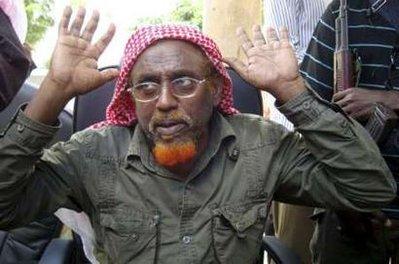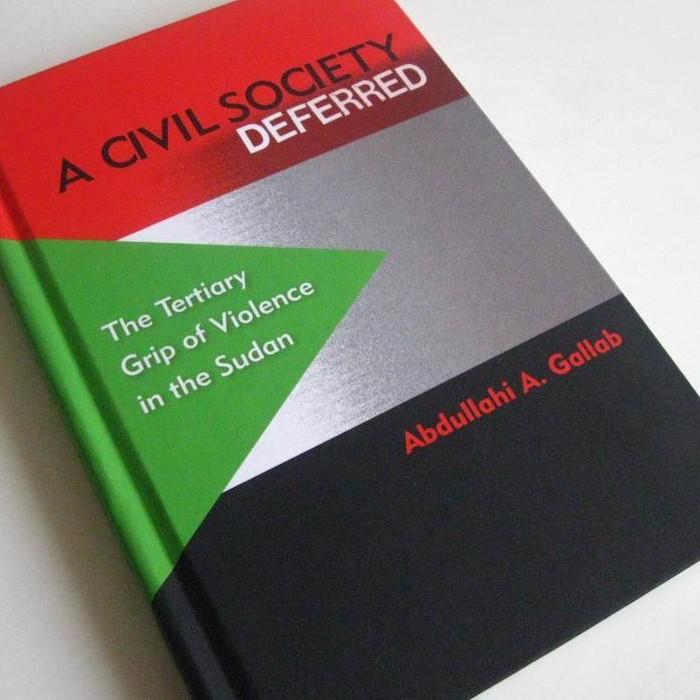Endgame for Aweys; but Al-Shabaab will continue – By Abdihakim Ainte


Hasan Dahir Aweys' capture may help the Somali government talk to other more moderate Islamist leaders.
Finally, the fate of Hassan Dahir Aweys – Somalia’s foremost Islamist – has been determined. While details of the operation that led to his apprehension are unclear, he appears to have voluntarily surrendered to the Ximan & Xeeb administration – a tiny district in central Somalia from which he hails.
This should surprise no one who has been paying attention to Aweys’ declining fortunes. He had long been waging a fierce battle with Al-Shabaab and became the dark horse within the hardliners (who distrusted his national ambition). Fortunately for Aweys, his primarily nationalist ideology kept him off of the US’s most wanted list.
As most counterterrorism experts have been quick to point out, his capture does not spell the end for Al-Shabaab or terrorist activity in Somalia. Quite the contrary, it may encourage hardliners to stage more deadly assaults in order to counter the view that Al-Shabaab is on the back foot.
Aweys regularly showed dissatisfaction with Al-Shabaab’s intolerant ideology and unflinching militancy. He openly condemned, for instance, the assassination of Omar Hashi, who was then the Minister of Defense within the Transitional Federal Government.
For more than three decades, Aweys defined Somalia’s narrative of political Islam, earning him both friends and foes within the Islamic movements. He was among the founders of AIAI (Ittahad al-Islamiyyah) – arguably the country’s largest ever armed militant Islamist group. For years, he used the spectre of the AIAI to drum up political and financial support, mainly from the Gulf States, to pursue his own political ambitions. In doing so, he argued that Islam is the only answer for Somalia and can be the only uniting factor against tribalism and factionalism.
Before he merged with Al-Shabaab, Aweys was a polarizing figure in the Islamist movement hell-bent on becoming its supreme leader – a title he held during the reign of the Islamic Courts Union (ICU) in 2006. That dream was, however, dashed when he joined Al-Shabaab and became a marginal figure. Since then his popularity has faded further and he has become unable to appeal to the broader political Islamic movement in Somalia.
What’s next?
To the hardliners, Aweys’ surrender represents an act of defection and, more crucially, a victory for their global Jihadist agenda – an agenda that Aweys long opposed.
If Aweys has struck a truce with the Somali government, as it seems, then Al-Shabaab will issue a Fatwa calling for his death as an apostate. To counter the likely Fatwa, Aweys will return to preaching sermons to debase hardliners and their sabotage of Islam.
In the best-case scenario, Aweys’ capture may also make it easier for the government to engage with other key moderate defectors like Mukhtar Robow – this is likely to be useful for any future negotiation between Al-Shabaab and the government.
Either way, the government should not be lulled into thinking that Aweys’ capture will end the conflict in Somalia. But the news probably came as a relief to the government which has of late been plagued by a wave of lethal suicide attacks against its precarious security apparatus.
Of course, Aweys’ capture has symbolic significance in the wider war against the rise of Islamism in Somalia and in this respect was overdue. However, it will not prove a decisive event in the war against Al-Shabaab.
Abdihakim Ainte is a Somali analyst and commentator. You can tweet him @Abdikhakim






Abdihakim, you have described in facts the times gone by Hassan Dahir, Most of Somali experts looks that Aweys will not rise and improve anything to the Government unless to safe him.
So, what do you think to surface Robow since he has great influence and a lot of militia under his control politically and personally because Robow has a power according to Aweys? Do you think that Robow will joint DF Administration and convey as you are Somali analysts?